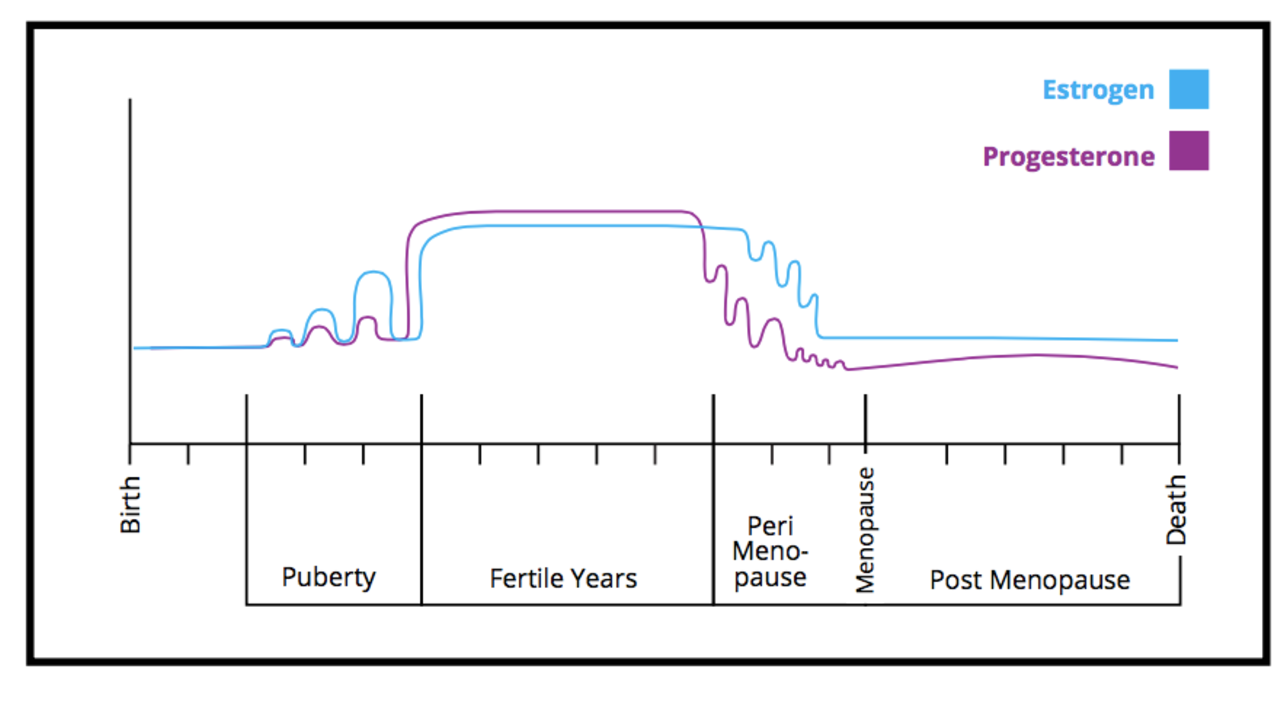Female Hormone Lifecycle

It is natural and normal for female hormone levels to fluctuate during one's lifetime.
From birth to puberty we have relatively low levels of reproductive hormones. This is until puberty starts around the average age of 11. Puberty brings a roller coaster of experiences as your body adjusts to the ups and downs and ultimately higher hormonal levels. Puberty is NOT a disease, just a natural transition that we all survived!
Next comes the fertile years. During this phase most women find their hormones settle into a pattern and become more predictable.
Peri-menopause starts for most women in their 40's. What happens during perimenopause is that the predictability of your hormones change. The frequency of ovulation reduces. You may still menstruate but your cycles may be closer together or further apart, the flow may be heavier or lighter and the colour may be darker and the consistency more clotty. Ultimately it is the reverse of puberty, your body is readjusting to the lower levels of hormones, although it can be a roller coaster of ups and downs during this time it's NOT a disease.
We see progesterone levels start to drop first, as progesterone is mainly produced by the act of ovulation. This can cause a problematic imbalance with estrogen. This is called a "relative estrogen imbalance". It's not that estrogen has risen its because the ratio of estrogen to progesterone has changed and as progesterone has dropped, this ratio is now high.
The average age for menopause is 51. Did you know that menopause is actually only one day in your life? (12 months after your last menstrual cycle). The next day you wake up and your post-menopausal. You will remain here for the rest of your life. In Australia, the average life expectancy for women is 83. This means you have over a 1/3 of your life left! And this is YOUR time!!!
We all know someone who woke up one morning and their periods had stopped with no or minimal symptoms. Why?
I think Dr. Sandra Thompson summed this up best. She says "If menopause symptoms were due solely to hormonal changes the menopausal experience would be more homogenous". What I think she is saying is the reduction of reproductive hormones is not fully to blame for the menopausal experience. Otherwise, we would all struggle and we would all have similar symptoms. But we don't. The menopausal experience is very different for every woman.
I say "Hormones load the gun, but what pulls the trigger". Yes, the reduction in reproductive hormones makes you more susceptible to symptoms at this time but it's your other individual circumstances that produce your symptoms. Some examples of common triggers that cause symptoms at this time may include poor thyroid function, poor liver function, high levels of stress, nutritional deficiencies, high toxin load, etc.
If you are ready to start looking at other factors that could be contributing to your symptoms load, you may find a faster and longer-term solution to your troubles. After all, most of us also know women on hormone replacement that are still struggling with menopausal symptoms. It's worth taking the time to investigate all possible underlying causes.
Something else to ponder is that post-menopause isn't a time of NO hormones, its a time of lower hormones. If the rest of your body if optimally functioning other organs such as your adrenals glands, liver, and adipose fat cells can produce reproductive hormones once your ovaries have retired!


